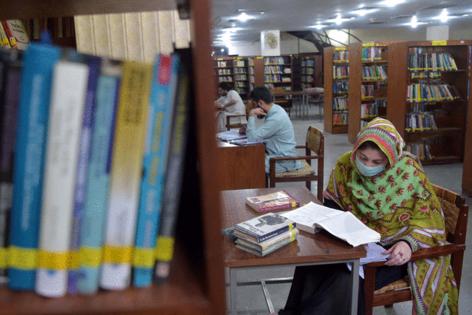Column: Tax breaks on books won't save reading from a slow death
Published in Books News
In a series of tax reforms designed to ease the burden on consumers’ wallets, Denmark has made several household essentials cheaper: Electricity, coffee, chocolate, cream puffs and books.
OK, so the cream puffs, or Vandbakkelser, may not be strictly necessary. In fact, the removal of the country’s oldest tax on chocolate and confectionery has proven controversial among those who believe it could encourage bad snacking habits. But most Danes are cheering on the tax cut for books. After all, Denmark had the highest value-added tax (VAT) rate (25%) for books in the world, by far.
Culture Minister Jakob Engel-Schmidt says that the move is intended to address the country’s “reading crisis,” but it will only go so far in fixing the issue.
Reading proficiency among young people has been dropping. The OECD’s 2022 Programme for International Student Assessment (PISA) found that 19% of Danish 15-year-olds scored below Level 2 in reading, meaning that they struggle to understand texts of moderate length. That’s up from 16% in 2018.
But this isn’t a uniquely Danish problem. Reading performance has been dropping among 15-year-olds across many countries in Europe.
Indeed, the reading crisis is global in nature. The share of Americans who read for pleasure is dropping, with the National Endowment for the Arts, a federal arts funder, reporting that fewer than half of adults in a 2022 survey said that they had read a book in the previous 12 months, compared to 55% in 2012. Just 38% had read a novel or short story.
Children are also losing their love of reading. The UK’s National Literacy Trust, a charity supporting literacy skills, found that reading enjoyment levels among children and young people have declined over the last two decades, with a particularly stark drop for those aged between eight and 18. Just 19% of that group say they read daily in their free time.
Parents have strong influences on children’s reading habits and ability. Reading to toddlers and small children not only helps them drift off to sleep but also helps them develop essential skills for school and beyond. A 2025 report from data company Nielsen and publisher HarperCollins reveals that even this is in steep decline: Just 41% of 0- to 4-year-olds are being read to frequently, down from 64% in 2012. That trend is likely to continue as generations raised on screens become parents.
So this cultural shift isn’t about the price of books, but more about the endless demands for our attention. Social media sites such as Meta Platform Inc.’s Instagram and ByteDance Ltd.’s TikTok are designed to be addictive, figuring out exactly what each individual wants to see and shoveling it at them so they remain engrossed for potentially hours at a time. A humble book doesn’t stand a chance against the modern internet’s sophisticated algorithms.
I can speak from personal experience. As a child and teenager, I was an avid reader, determined to work my way through lengthy tomes such as the "Lord of the Rings." But nowadays, I find myself slipping into bad habits. It’s far easier to endlessly scroll than it is to concentrate on a book.
My own pitfalls ring true with others, too. In a survey of UK adults by the charity The Reading Agency, almost 50% of non-readers say they can’t focus on a book, while 26% of lapsed readers say that “too much time spent on social media” stops them from sitting down with a novel. For adolescents, similar hurdles crop up, as well as a lack of access to books that they actually want to read, rather than books adults are telling them to.
It’s worth asking whether it matters that we’re reading less. But beyond the empathy, creativity and enjoyment we gain from engaging with written works, it’d be foolish not to worry about declining reading comprehension as misinformation and AI slop proliferate on internet platforms. If students don’t feel confident deciphering simple, multi-paragraph texts, then what hope do they have to scrutinize misleading claims and harmful rhetoric?
Denmark has taken a great first step in making books more affordable — arguably something that should have been done long ago. But it won’t fix the problem without a broader societal change.
In terms of what the government could do, funding for libraries is potentially even more important in terms of making books accessible. Sadly, the UK has seen almost 800 libraries close since 2010, and library budgets in the US are also under threat.
At home, the solutions are simple: Parents need to read to their children, and encourage bookishness as they grow up, while trying not to worry too much about the quality of the literature. Surveys have shown that young people are more motivated to read books linked to movies and TV. The "Bridgerton" series may not be Jane Austen, but it might open the door to "Pride and Prejudice" later on. Keeping screens to a minimum for as long as possible will likely be helpful, too.
There’s a glimmer of hope in literature-loving role models such as Dua Lipa. The pop star founded Service95, a weekly lifestyle newsletter with a monthly book club. Watching Lipa interview authors, it’s clear that she loves to read and she’s been praised for her insightful questions. Can bookfluencers like her spark a reading renaissance? They can’t hurt.
If you need me, I’ll be tucked up with a book ("Intermezzo" by Sally Rooney, if you must know) and a cream puff tonight — with my phone on silent.
____
This column reflects the personal views of the author and does not necessarily reflect the opinion of the editorial board or Bloomberg LP and its owners.
Lara Williams is a Bloomberg Opinion columnist covering climate change.
©2025 Bloomberg L.P. Visit bloomberg.com/opinion. Distributed by Tribune Content Agency, LLC.













Comments